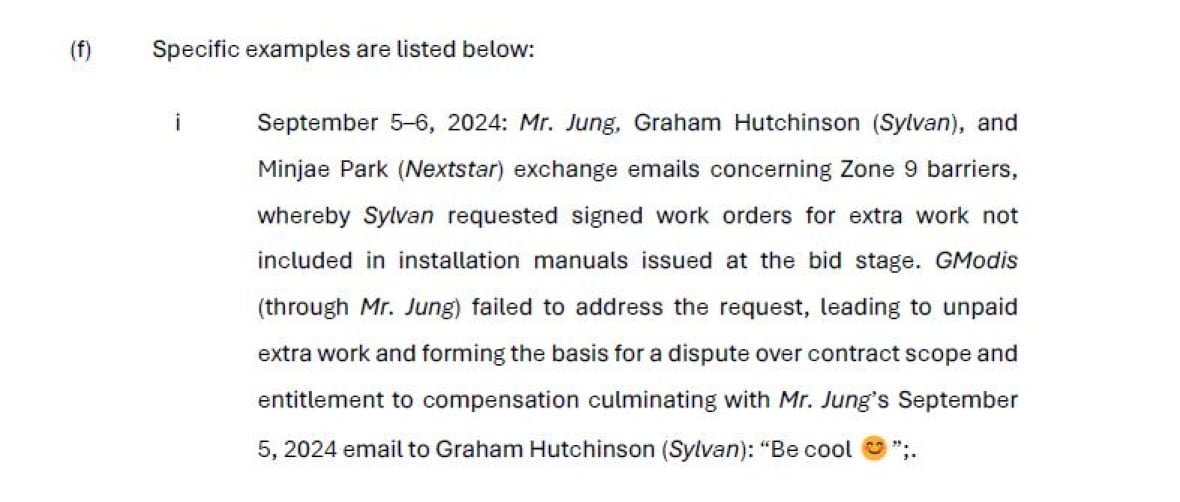Multiple Canadian contractors that have helped build a sprawling, taxpayer-supported electric vehicle (EV) battery plant in southwestern Ontario allege they haven’t been paid for millions of dollars worth of work, court records show.
Lawsuits between companies on complex projects like the NextStar Energy plant in Windsor aren’t abnormal, according to a veteran construction lawyer.
“The issues raised by the pleadings delivered thus far are fairly standard stuff in the world which I inhabit,” said Geza Banfai, a Toronto construction and infrastructure who is not involved in the lawsuits.
But Sylvan Canada, one of the firms that has now resorted to legal action, says its experience on the $5-billion project was far from business as usual.

“This is truly an exceptional situation — both in scale and in the complete breakdown of co-operation,” says Eric Farron, the company’s vice-president of operations.
Sylvan’s $45-million lawsuit, filed in early July, does not directly target NextStar, a joint venture between global carmaker Stellantis and South Korea’s LG Energy Solution. Instead, it accuses another South Korean company — GModis and its CEO, John Kwangho Jung — of “egregious” mismanagement that threatened on-site safety and led to costly errors.
The problems came to a head last month when GModis’s alleged interference led NextStar to “abruptly” remove Sylvan from the project, the 43-page statement of claim said. Sylvan then had to lay off nearly 200 workers at the plant, Farron previously told CBC Windsor.
The allegations involve a highly anticipated battery plant in Canada’s automotive capital that proponents have maintained will create thousands of jobs in a manufacturing bastion that has never fully recovered from the mass layoffs of the 2008 financial crisis.
Both the federal and Ontario governments have pledged more than $15 billion in incentives to keep the project in Canada — a move that has spurred sharp criticism, as has NextStar’s plans to use hundreds of workers from South Korea to build the plant.
The public records claim NextStar has doled out several contracts — including one for roughly $250 million — to South Korean firms to handle different parts of the project.
None of the allegations have been proven in court.
In a statement, NextStar said it would not comment on legal issues, including those “it is not a party to.” It did say, however, that it has hired roughly 900 people and is “very grateful” for government support.
“NextStar Energy is extremely proud of the progress made on the construction of the 4.23 million-square-foot facility, Canada’s first large-scale domestic battery manufacturing facility,” the statement said.
Jung and GModis did not respond to a request for comment and have not yet filed a statement of defence.
Sylvan is not the only domestic firm that has turned to the courts to try to recoup money they say they’re owed for work on the battery plant.
Earlier this year, Vaughan-based Consult Mechanical Inc. sued a branch of a different South Korean company for breach of contract, seeking $6.2 million in alleged unpaid work.
That company — CK Canada Inc. — was established in 2023, the year after construction kicked off on the NextStar facility in Windsor’s east end, according to a local job portal. NextStar hired the firm, listed as the Canadian branch of South Korea’s CK Solution Co. Ltd., last year to procure and install equipment, CK Canada Inc. said in a statement of defence and counterclaim.
It then inked a $27-million deal with Consult Mechanical Inc. to provide and install piping, per the court records. But the relationship quickly fell apart, with CK Canada Inc. claiming that Consult Mechanical Inc. fell behind schedule — something it firmly denies.
Paul Leddy, a project manager with Consult Mechanical Inc., declined to comment on the ongoing litigation. “The only thing I will say […] is that the Korean firm that’s running it […] they don’t have much experience in North American construction, so there [were] a lot of issues on-site,” Leddy said.
‘Significant schedule pressure,’ says lawyer
Banfai, who also serves as program director for Osgoode Hall’s construction law certificate course at York University, wrote in an email that the court filings suggest “this was a project which was under significant schedule pressure, with the scope of the work allocated among various contractual chains all emanating from NextStar, and all of this requiring close co-ordination and planning.
“When the inevitable happened — the ‘inevitable’ being changes which occurred on the project, delays of various kinds, failures of subcontractor performance in some instances, and so on — the parties behaved quite rationally: they protected their own profit and sought to offset liability for unexpected costs to others,” said Banfai.

CK Canada Inc. claims that “in failing to maintain the construction schedule,” Consult Mechanical Inc. had “created a perilous situation for CK’s contractual obligations” with NextStar.
Consult Mechanical Inc. shot back in a reply and defence to the counterclaim, saying it was given “faulty materials” and never got access to important documents, such as site plans or the construction schedule itself, “because the scope of work, specifications and details of work were constantly changing.”
A lawyer for CK Canada Inc. did not respond to a request for comment.
Court records from another case involving work at the battery plant also reference the “very rapid pace” of construction on the project. Local company RVR Concrete Inc. is suing Toronto-based GIP Paving Inc. for $11.6 million in unpaid work and $24 million in damages.
RVR Concrete claims, among other things, that GIP Paving told it to pour concrete in the winter despite the cold weather, then failed to pay for the remediation work that was required when the concrete had defects.
“GIP was clear that the concrete pours had to be completed as quickly as possible, as my client’s work was crucial to the advancement of the project,” Andrew Colautti, a lawyer for RVR Concrete, wrote in a May 1 email. “The remaining construction of the Cell and Module buildings could not proceed until my client had completed all of its work.”
Mario Liburdi, president of RVR Concrete, said in a statement the company and its employees “performed work at the battery plant that was worth millions of dollars” and that was not reimbursed.
“RVR does not believe that this is right or fair: it did the work; it poured concrete to make the floors and machinery foundations of the battery plant,” Liburdi said. “RVR wants to be paid for what it believes it is owed.”
In a statement of defence and counterclaim, GIP Paving denies RVR Concrete’s allegations. John Margie, a lawyer for GIP Paving, declined to comment on the case while it’s before the court.
Sylvan Canada’s lawsuit also mentions a time crunch — claiming it “had bid the job without complete information because NextStar rushed the tender.”
But Sylvan’s statement of claim, filed July 8, alleges issues far beyond a tight schedule.
Chaos, confusion, site delays: Sylvan lawsuit
NextStar, through GModis, awarded Sylvan a contract to install and inspect equipment throughout the facility in April 2024, according to the lawsuit. The original deal was worth nearly $69 million, but was shortly thereafter dropped to roughly $52 million because of a change to the scope of work.
That same month, GModis Inc. was incorporated as a business in Ontario, according to the province’s registry. The company’s office is listed at a residential address in Tecumseh, Ont., Sylvan said in the lawsuit.
The lawsuit names both GModis Inc. and GModis LLC, headquartered in Seoul, as defendants as they operated as one. Sylvan says it “was directed to understand” that GModis was serving as a consultant on the contract, and that NextStar hired the South Korean firm “to co-ordinate and oversee aspects of the project’s construction and engineering.”
By the new year, the project “was in serious trouble schedule-wise, running months behind the original plan,” Sylvan’s lawsuit claims.
Jung, GModis’s CEO, said himself the project was behind earlier this year. In an industry presentation in Dallas, he said “schedule delays occurred, resulting in significant cost overruns to catch up.”
Jung also billed himself as a qualified engineer and lawyer who has worked on refinery projects in Vietnam, Turkey and the United Arab Emirates.
But Sylvan alleges in its statement of claim that neither Jung nor any of the other GModis employees on the NextStar job were licensed to practise engineering in Ontario, exposing “the project (and Sylvan) to serious risks, unanticipated costs, and regulatory breaches.”
Jung’s LinkedIn profile lists engineering certifications and licences abroad — but none in Ontario.
Sylvan claims GModis also “failed to ensure a safe and orderly work environment as required under Ontario construction safety regulations by causing chaos in scheduling and site co-ordination.” Sylvan accuses GModis of “lack of document control” as well, which “created confusion, inconsistent record-keeping and breakdowns in communication on the project.”
Sylvan alleges it didn’t get important installation materials and design drawings on time, either, “and those that were issued lacked a required professional engineering seal from an Ontario-licensed engineer.”
By spring, the project “had become effectively unmanageable for Sylvan” because of GModis’s and Jung’s “negligent co-ordination” and the other alleged issues, per the lawsuit. It seeks $38 million in alleged unpaid costs and more in damages.

“Litigation is never our preferred route — we consistently try to resolve project issues through dialogue, negotiation and collaborative problem-solving,” Farron, the Sylvan executive, said in a statement. “Unfortunately, in this case, those efforts were not reciprocated.”
Construction liens on city-owned land
Except in the Sylvan case, the disputes have so far meant that municipally owned lands have been slapped with construction liens — legal claims for payment attached to the properties themselves.
That’s because the City of Windsor owns the land on which the NextStar facility has been erected. City council in 2022 approved spending $53 million to acquire land needed for the project.
The city’s ownership of the properties — and NextStar’s lease of them — mean both have been named, at least initially, as defendants in the two cases. But both liens have since been vacated, so the companies accused of non-payment have posted the funds to the Ontario Superior Court of Justice, where the cases are being litigated.
NextStar and the city have as a result been dropped as defendants in the RVR Concrete case, the court records show, and “will likely be dismissed in due course” from the Consult Management Inc. case, Banfai says.
But another lien — the largest one to date — remains. Last month, a company called Jeil M&S Canada Inc. placed a $52,690,183 construction lien on the properties associated with the battery plant, according to public records.
The figure is what the company, in the June 10 lien application, alleges NextStar owes it for supplying “labour, services, materials and equipment for among other things, ESST mixing and battery manufacturing equipment” over the course of more than a year. The original contract was worth nearly $250 million, the document says.
Jeil M&S Canada Inc. is the Canadian arm of South Korean firm Jeil M&S, which produces secondary battery-mixing equipment, among other things. It says it established the Canadian operation in November 2022, the same year the project broke ground.
Michael Swartz, a Toronto-based lawyer for Jeil M&S Canada Inc., declined to comment on this story as the “claim for lien is still an active litigation file.”
NextStar said Jeil M&S Canada Inc.’s lien “is unwarranted and improperly inflated. There is no merit to it and the company intends to dispute any claim associated with the lien.”
Banfai said “these kinds of claims are, regrettably, not that unusual in large, complex projects such as this one.” It’s part of the business, he said — “though anyone would appreciate what an indictment of the construction industry that is.”
He said he doesn’t see a direct “public interest component” to all the litigation.
“We don’t know how much, if any, of the public money invested in this project is allocable to the costs of litigation, but to the extent it may be, the public can draw its own conclusions about the utility of that.”
The City of Windsor declined to answer questions about the liens or potential legal costs, saying it “does not comment on matters as they are being litigated.”
The provincial government did not reply to a request for comment. The federal government did not provide a response before publication time.
NextStar, for its part, said work is ongoing and on schedule.
“The company and its contractors continue to collaborate to ensure the project reaches successful completion,” the company said. “Cell production is scheduled to begin later this year.”